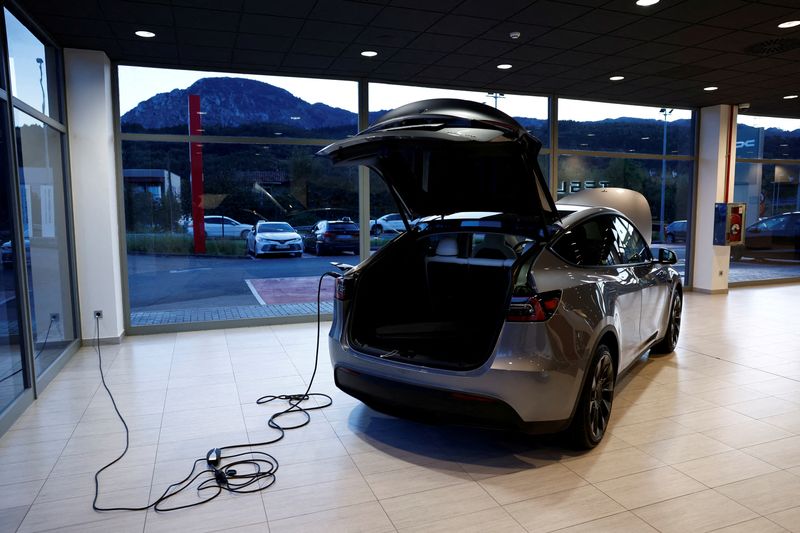By Laura Sanicola
(Reuters) - There is plenty of hand-wringing on display at the COP28 climate conference in Dubai about the slow pace of reducing the consumption of fossil fuels to fight climate change. But one positive that delegates can point to is the growing fleet of electric vehicles worldwide that is already making a surprisingly big dent in demand.
Growing sales of electric vehicles in recent years have led forecasters to speed their projections for when global oil use will peak, as public subsidies and improved technology help consumers overcome the sometimes eye-popping sticker prices for battery-powered cars, according to industry experts.
The Paris-based International Energy Agency (IEA), a grouping of 29 industrialized nations, expects world oil consumption to hit its zenith at the end of this decade at 103 million barrels per day, after making regular adjustments from its 2017 forecast of a nearly 105 million bpd peak in 2040.
"The game-changer has been the policy support for the shift to electrification quite substantially reducing oil demand from transportation sector, which has been the key driver of global oil demand growth," said Apostolos Petropoulos, an energy modeler at the IEA.
Oil giant BP (LON:BP) has pushed forward its global peak oil demand projections, while the governments of both the United States and China - the world's two biggest oil users - have ratcheted back their domestic consumption forecasts.
Transportation is responsible for about 60% of world oil demand, with the United States alone accounting for around 10%, according to the IEA. That share should fall, as the IEA expects EVs will have erased some 5 million barrels per day of world oil demand by 2030.
Global EV sales now make up about 13% of all vehicle sales and are likely to rise to between 40%-45% of the market by the end of the decade, according to the IEA. That is thanks to a blend of increasingly stringent efficiency standards and subsidies introduced by various governments about the world since the 2015 Paris Agreement to hold global warming to within 1.5 degrees Celsius (2.7 degrees Fahrenheit) above pre-industrial temperatures.
The latest subsidy measures include the U.S. Inflation Reduction Act's $7,500 tax credit for purchasing a new EV, passed last year and intended to help offset high sticker prices.
While those numbers are big, the IEA has said EV sales would need to be even higher – on the order of 70% of the market by 2030 - to keep to the Paris Agreement target for limiting warming.
Whether sales can scale those heights is uncertain.
EV makers including General Motors (NYSE:GM), Ford and Stellantis in recent weeks have delayed or scrapped plans to accelerate production amid rising labor costs and signs that higher interest rates are slowing growth in the United States.
In the longer term, though, falling costs for EV batteries have some researchers feeling optimistic.
CHEAPER IN CHINA
The rate of future EV adoption is going to depend heavily on EV pricing and the availability of charging stations, according to industry experts. China has the advantage on both counts.
The average electric vehicle in China cost 31,165 euros ($33,964) in mid-2023, according to UK research firm JATO Dynamics. The cheapest EV in China was 8% less expensive than the cheapest gasoline-powered equivalent car, JATO found. That is thanks to massive government subsidies and easy availability of rare earths that are crucial in EV production.
EVs have about a quarter of the market in China, and the country is expected to lead global growth.
In the United States, by contrast, the average price for an EV is more than $53,000, according to automotive research company Kelley Blue Book, around $5,000 more than a gasoline-powered car.
The United States also lags well behind China in total number of public charging stations. An industry-funded white paper released in October by the Electrification Institute noted that the United States has about 52,000 public charging stations, Europe about 400,000 and China about 1.2 million.
Even so, EVs are expected to grow to up to 50% of new U.S. car registrations by 2030, according to the IEA, as drivers are drawn to the improving technology, falling prices and the prospect of sidestepping volatile prices at gas pumps.
"Change on the political side could delay the transition," said the IEA's Petropoulos, referring to concerns among some EV makers that next year's U.S. election could usher in a new set of policies. "But ultimately the transition is happening now."
___

For daily comprehensive coverage on COP28 in your inbox, sign up for the Reuters Sustainable Switch newsletter here.
($1 = 0.9176 euros)